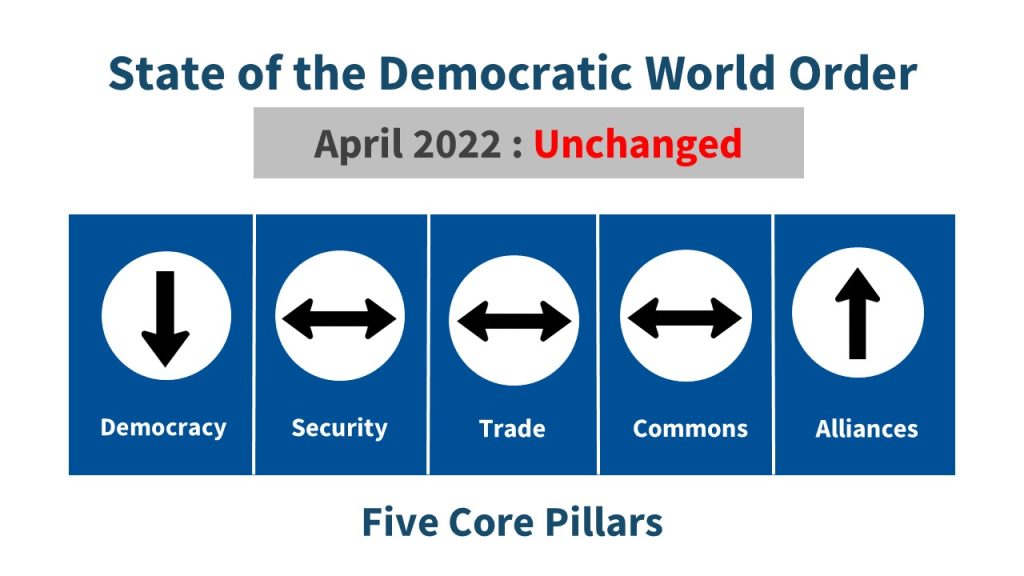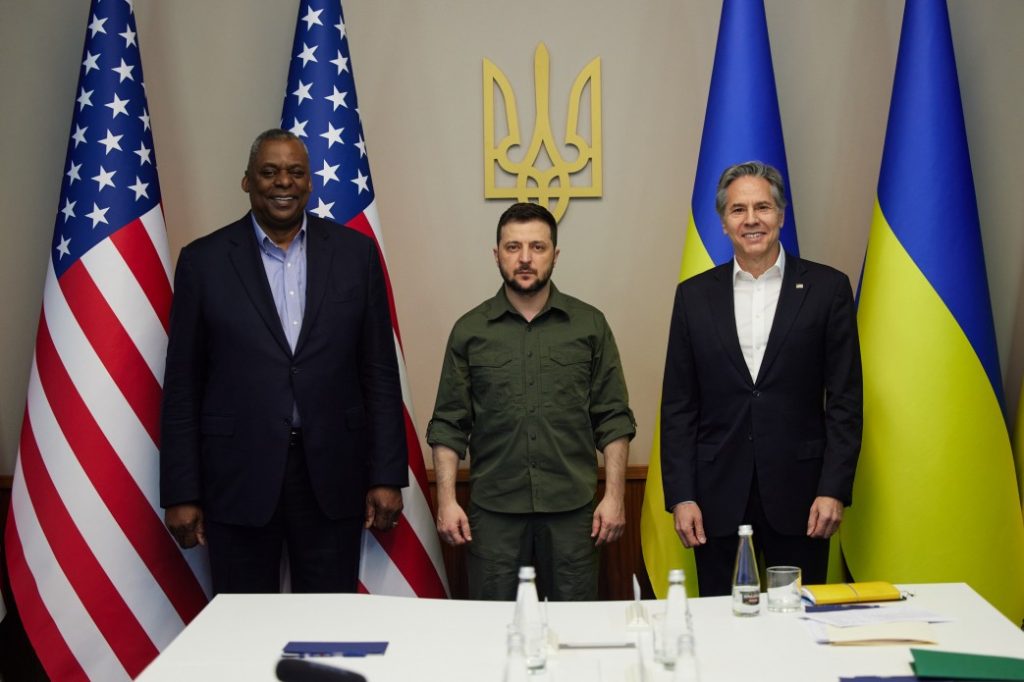Reshaping the order
This month’s topline events
Ukraine Fights Back. After being forced to redeploy its troops away from Kyiv, Russia continued to face stiff resistance from Ukrainian forces in the eastern Donbas region, while making incremental gains in other areas including the port city of Mariupol. Russian leaders, facing mounting losses on the battlefield, once again suggested the possibility of nuclear escalation. As the United States and its NATO allies, notably including Germany, increased delivery of heavy weapons to Ukraine, Secretary of Defense Lloyd Austin indicated that America’s goal is to see a “weakened” Russia that no longer has the capacity to invade its neighbors.
- Shaping the order. The unexpected resilience of the Ukrainian military has raised hopes that the Kremlin may eventually be forced to fully withdraw its forces from the country – an outcome that would have a profound impact on European security and the democratic world order. But with Moscow seemingly prepared to sustain heavy losses, Ukraine could be facing a months-long war of attrition, with the daunting possibility that Russian president Vladimir Putin may consider using weapons of mass destruction if conventional forces fail to achieve his desired outcomes.
- Hitting home. As the American public continues to express strong support for Ukraine, Congress passed a “lend-lease” bill – modeled after a similar act to assist Britain during World War II – that allows the president to expedite the provision of military equipment to Ukraine.
- What to do. The United States and its allies should continue to intensify military support for Ukraine, including by following through on the robust commitments made at the recent 40-nation defense forum held in Germany.
Russia Halts Gas Exports. Russia’s state-owned energy company Gazprom halted gas exports to Poland and Bulgaria after they refused Moscow’s demand to make payment in rubles, and the Kremlin warned that other nations could face a similar fate. The EU condemned the move as an “instrument of blackmail” and sought to implement contingency plans to provide alternative supplies of gas to the affected nations, while getting set to propose a phase-out of Russian oil imports by the end of the year.
- Shaping the order. Russia’s move to cut off gas exports to Europe marks a sharp escalation in the growing economic war between Russia and the West. While its immediate impact may be limited, a wider cut-off of gas supplies could result in serious supply shortages for many European nations. Germany, Italy, and others in Europe are still heavily dependent on Russian energy, which has provided the Kremlin with a significant source of coercive leverage.
- Hitting home. With Russia serving as the source of eight percent of US energy imports, the Biden administration acted in March to ban all Russian gas, oil, and coal.
- What to do. Washington should coordinate closely with the EU, including through the recently formed US-EU Task Force for Energy Security, to help mitigate the impact of Russian energy supply threats. More broadly, the United States and its allies should consider a new allied trade partnership to reduce the vulnerability of democracies to economic coercion by Russia, as well as China, across a broader range of critical industry sectors.
Macron Wins Re-Election. French president Emmanuel Macron won a second term after defeating far-right candidate Marine Le Pen, who received just over 40 percent of the vote. The election was being watched closely in capitals around the world, given Le Pen’s pro-Russia leanings and her expressed priorities, if elected, to limit French military support to Ukraine, oppose sanctions against Russia, and withdraw from NATO’s integrated command.
- Shaping the order. Macron’s victory is a welcome result for the Western alliance and the democratic world order. Given her close ties to Putin, a victory by Le Pen could have seriously undermined collective efforts by the United States and leading democracies to defend the order from Russia and China. Still, the relatively high percentage of the vote that she received suggests that illiberal populism remains a powerful political force in French politics, which could also have an impact on France’s role in Europe and the world.
- Hitting home. Similar brands of populism continue to draw support in other democracies, including the United States, where polls show significant support for former president Donald Trump should he decide to run again.
- What to do. While seeking to address the conditions that help fuel illiberal populism, Western leaders should also bolster efforts to combat Russian propaganda and disinformation, which are likely to ramp up again as the United States and other democracies look ahead to their own upcoming national elections.
Quote of the month
“It is not only Ukraine fighting for its sovereignty and integrity… they are also fighting for the question whether humanity will prevail or whether heinous devastation will be the result. It is the question whether democracy will be stronger or if it is autocracy that will dominate.”
– European Commission president Ursula von der Leyen, April 9, 2022

State of the Order this month: Unchanged
Assessing the five core pillars of the democratic world order
Democracy (↓)
- Following Russia’s withdrawal from areas around Kyiv, evidence revealed that Russian troops had engaged in an appalling series of mass killings and atrocities against Ukrainian civilians in the town of Bucha. In response, the United States, EU, and the G7 imposed harsh new sanctions against the Putin regime, while 93 countries voted to suspend Russia from the UN Human Rights Council.
- Hungary’s president Viktor Orban, who has been criticized for scaling back democratic norms and for his sympathies with Russia, and Serbia’s president Aleksandar Vucic, who has established close ties with China, both won their bids for re-election.
- A Turkish court transferred the trial of 26 Saudis accused in the gruesome killing of Saudi dissident Jamal Khashoggi to Saudi Arabia, a move that comes as Ankara looks to repair relations with Riyadh and is likely to hasten a cover-up by Saudi authorities.
- In its annual report documenting global human rights abuses, the State Department indicated that authoritarian regimes are becoming more brazen in reaching across borders to attack critics, while the world continues to experience what Secretary of State Antony Blinken described as an “alarming recession of democracy.”
- With these developments, the democracy pillar was weakened.
Security (↔)
- Russia faced significant pushback from Ukrainian forces in its ongoing military invasion, as the United States and its allies continued to bolster security and economic assistance for the government of President Volodymyr Zelensky.
- Chinese president Xi Jinping joined leaders of the EU for a virtual summit meeting, the first in two years, that ended up highlighting key differences over Ukraine and human rights. While China sought to emphasize its “extensive common interests” with Europe, Josep Borrell, the EU’s foreign policy chief, described the exchange as a “dialogue of the deaf.”
- Nuclear negotiations with Iran reached a stalemate, as the Biden administration remained firm in its refusal to remove the Islamic Revolutionary Guard Corps – a branch of the Iranian military – from the US list of foreign terrorist organizations.
- Overall, the security pillar remained unchanged.
Trade (↔)
- Russia’s state-owned energy company Gazprom halted gas exports to Poland and Bulgaria following their refusal to make payment in rubles, as the EU sought to implement contingency plans to provide alternative supplies of gas to the affected nations.
- India and the European Union agreed to establish a trade and technology council to increase cooperation across a range of economic and technology-related areas. Separately, India signed a landmark free trade agreement with Australia.
- On balance, the trade pillar was unchanged.
Commons (↔)
- The level of carbon dioxide in the earth’s atmosphere reached a record high, averaging 420 parts per million, an indication that efforts to rein in carbon emissions are falling short.
- The United States and 54 other countries signed a declaration to keep the internet free and open, in response to rising authoritarianism in cyberspace, particularly by Russia and China.
- Residents of Shanghai faced shortages of food and medicine following a strict lockdown, as China attempts to continue its “zero COVID” strategy amidst its biggest wave of infections since early 2020.
- Russia announced that it will withdraw from the International Space Station in response to international sanctions, putting an end to a longstanding area of scientific cooperation between the United States and Russia
- On balance, the commons pillar was unchanged.
Alliances (↑)
- The United States, EU, and the G7 stood united in imposing new sanctions on Russia, while NATO foreign ministers, meeting in Brussels, affirmed their support for Ukraine, and Germany joined other transatlantic allies in providing heavy weapons to Kyiv.
- Prompted by concerns over Russian aggression, Finland and Sweden agreed to submit simultaneous applications for NATO membership, as NATO Secretary General Jens Stoltenberg indicated they would be welcomed into the alliance.
- The United States, Britain, and Australia agreed to expand their cooperation under the AUKUS security pact to include joint development of hypersonic weapons.
- President Joe Biden and Indian prime minister Narendra Modi met virtually ahead of the US-India 2+2 Ministerial Dialogue, aimed at reaffirming the bilateral partnership amid differences over India’s stance on Russia’s invasion of Ukraine and ongoing purchases of Russian oil.
- Overall, the alliance pillar was strengthened.
Strengthened (↑)________Unchanged (↔)________Weakened (↓)
What is the democratic world order? Also known as the liberal order, the rules-based order, or simply the free world, the democratic world order encompasses the rules, norms, alliances, and institutions created and supported by leading democracies over the past seven decades to foster security, democracy, prosperity, and a healthy planet.
This month’s top reads
Three must-read commentaries on the democratic order
- David Kramer, in the Journal of Democracy, contends that the best hope for democracy in Russia – and all of Eurasia – is for the international community to support Ukraine in its efforts to defeat Vladimir Putin.
- Anne Applebaum, in The Atlantic, argues that the liberal world order is not “natural,” and that democracies must act together to enforce the rules and defend against autocracy
- Shashi Tharoor, in Foreign Affairs, suggests that India needs to rethink its stance of neutrality on Russia’s invasion of Ukraine.
Action and analysis by the Atlantic Council
Our experts weigh in on this month’s events
- The Atlantic Council hosted an event with US Treasury Secretary Janet Yellen, who spoke about strengthening US alliances and called for “friend-shoring” of supply chains to trusted countries around shared values of international cooperation.
- Fred Kempe, in CNBC, suggests that the United States and democratic world must do more to stop Putin and defend Ukraine’s sovereignty and freedom amid rising authoritarianism.
- Barry Pavel and Hans Binnendijk, in Defense One, outline the need for a NATO transition plan to facilitate swift and secure accession of Finland and Sweden into the alliance.
- In a Fast Thinking piece for the Atlantic Council, Dan Fried and Gissou Nia discuss how to hold Russia accountable for its deplorable war crimes in Ukraine.
- Natasha Lander Finch, in The New Atlanticist, argues that NATO must do more to deter Russia from using chemical or biological weapons in Ukraine.
__________________________________________________
The Democratic Order Initiative is an Atlantic Council initiative aimed at reenergizing American global leadership and strengthening cooperation among the world’s democracies in support of a rules-based democratic order. Sign on to the Council’s Declaration of Principles for Freedom, Prosperity, and Peace by clicking here.
Ash Jain – Director for Democratic Order
Dan Fried – Distinguished Fellow
Jeffrey Cimmino – Associate Director
Danielle Miller – Program Assistant
Otto Hastrup Svendsen – Georgetown Student Researcher
If you would like to be added to our email list for future publications and events, or to learn more about the Democratic Order Initiative, please email AJain@atlanticcouncil.org.
